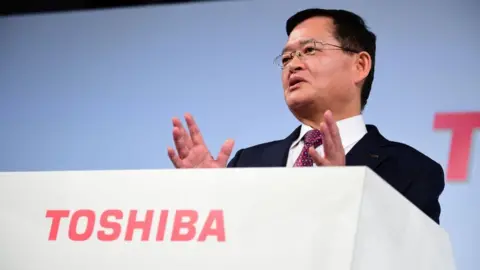Toshiba president steps down amid $20bn buyout bid
 Getty Images
Getty ImagesToshiba's chief executive resigned on Wednesday amid controversy over a $20bn (£14.5bn) buyout bid from private equity firm, CVC Capital Partners.
A statement from the Japanese conglomerate gave no reason for Nobuaki Kurumatani's resignation.
However, he had faced criticism from activist shareholders over the bid from CVC, his former employer.
Toshiba's shares surged on reports that more suitors were planning offers on the electronics giant.
In a meeting following the announcement, Toshiba's chairman Osamu Nagayama said CVC's bid was unsolicited and lacking in substance, and requires cautious consideration.
He said it is impossible to say how Toshiba would respond to the proposal, as it is not yet official.
The board had no plans to fire Mr Kurumatani, who had helped lead Toshiba's recovery, Mr Nagayama said.
Toshiba shares were up more than 6% in Asian morning trading on Wednesday following media reports of potential rival bids for the company from rival bidders.
The Japanese conglomerate said on 7 April that it had received an offer to take the company private from buyout firm CVC. The bid reportedly valued Toshiba at $20bn.
Hong Kong-based activist investment firm Oasis Management criticised the proposal, saying on Tuesday that the bid was far below the fair value of Toshiba.
The incoming chief executive Satoshi Tsunakawa said there is room for improvement in governance, as pointed out by another activist shareholder group Effissimo.
Changing business empire
Toshiba is one of Japan's oldest and largest firms, with divisions that range from home electronics to nuclear power stations.
However, the company has faced wrenching changes in recent years as it dealt with the fallout of an accounting scandal and huge losses linked to its US nuclear unit.
It was forced to sell its profit-making memory chip unit, considered the crown jewel of its business empire, to make up for huge losses.
Last year, it also sold off its last remaining stake in personal computer business Dynabook.
The company's shares were demoted to the Tokyo Stock Exchange's second tier in 2017 and only returned to the main listings section in January.
